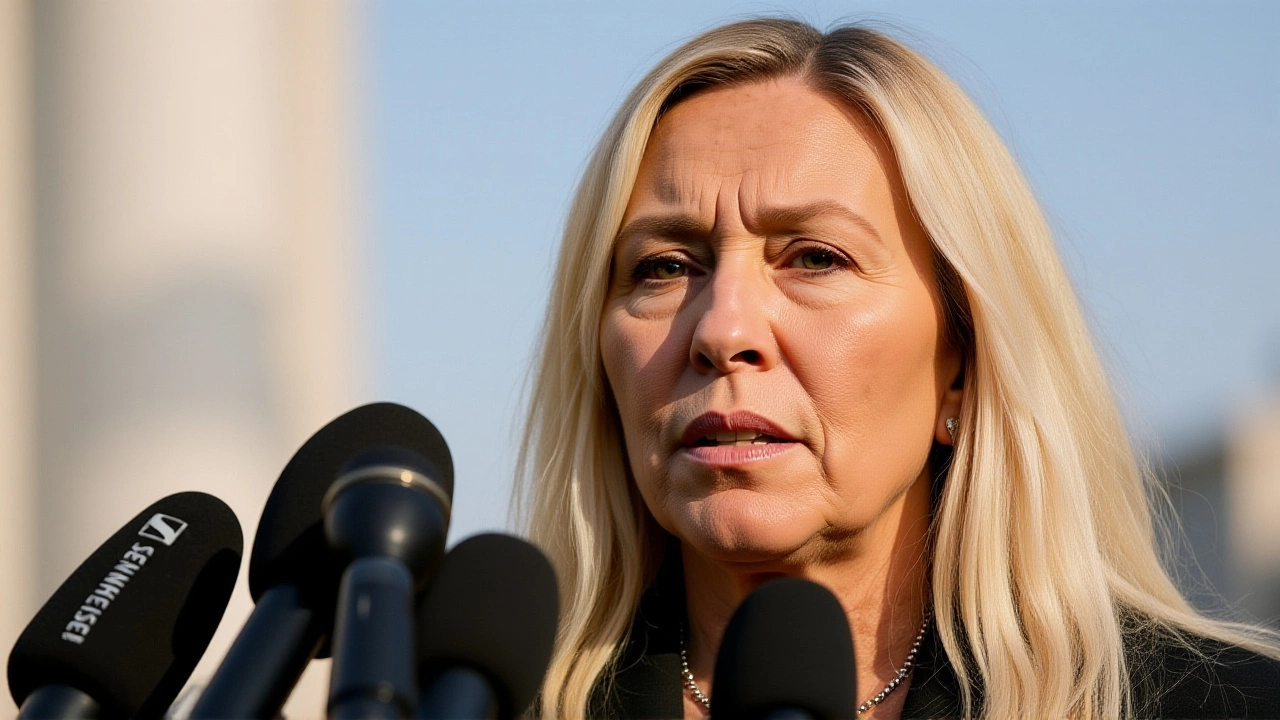When Marjorie Taylor Greene dropped her resignation on Friday night, November 21, 2025, it wasn’t just a political exit—it was a bomb dropped in the middle of a Republican civil war. The Georgia congresswoman, 49, announced she’d leave office on January 1, 2026, nearly a full year before her term ended, citing a bitter rift with Donald J. Trump and GOP leadership that had turned personal. Her statement was blunt: "I do not want my sweet district to have to endure a hurtful and hateful primary against me by the president that we all fought for." And then came the twist: Trump, hours later, blamed her resignation on "plummeting poll numbers." The truth? It’s both. And neither tells the whole story.
How the Feud Escalated
The fracture didn’t happen overnight. It started in mid-October 2025, when Greene publicly slammed Republican leaders for ignoring the looming expiration of Affordable Care Act tax credits—set to lapse on December 31, 2025. She pointed out that 12,450 Georgians in her district would lose subsidies, and accused Speaker Mike Johnson and House Minority Leader Hakeem Jeffries of indifference. But the real turning point came on November 5, 2025, when Trump privately told RNC members he’d back a primary challenger against Greene. By November 12, she fired back on Newsmax: "The president seems to have forgotten who got him across the finish line in Georgia." That was the moment the gloves came off.Then came the poll numbers. A SurveyUSA survey conducted November 10–15, 2025, showed Greene’s approval had cratered to 38%, with 52% disapproving. Greene dismissed it as "biased," but insiders say the numbers reflected something deeper: voters were tired of the chaos. Her district, Georgia’s 14th Congressional District, stretches from Rome to Dalton and into the Atlanta exurbs, home to 765,817 people. Many of them aren’t hardline partisans—they’re small business owners, teachers, retirees. And they didn’t sign up for a weekly political bloodbath.
Trump’s Response: Blame, Not Sympathy
Trump’s reaction, delivered via social media at 8:42 a.m. ET on November 22, 2025, was classic. No acknowledgment of her loyalty. No gratitude for her relentless campaigning in 2024. Just a cold, calculated dismissal: "Green is resigning because of quote plummeting poll numbers." He misspelled her name. That wasn’t an accident. It was a signal. To his base, it meant: "She’s weak. I’m still in control." To Republicans in Congress, it meant: "Don’t cross me. I decide who survives."But here’s what Trump didn’t say: Greene was his most reliable House ally since 2020. She defended him on impeachment. She amplified his election fraud claims. She turned her committee hearings into propaganda platforms. She was the firebrand he needed—until she wasn’t.
The Fallout: A Special Election and a Republican Vulnerability
Under Georgia law, a special election must be held within exactly 40 days of Greene’s departure. That means voters in Georgia’s 14th District will head to the polls no later than February 9, 2026. That’s less than three months before the Republican National Convention. And it’s a nightmare for GOP strategists. The district is solidly red—Trump won it by 28 points in 2024—but a messy primary could expose fractures. Democrats are already circling. A strong Democratic candidate could turn this into a national bellwether.And make no mistake: this isn’t just about one seat. It’s about control of the House. Greene herself warned in October that Republicans would "likely lose" the House in 2026. Her resignation, timed just 13 months before the midterms, makes that prediction feel less like a guess and more like a prophecy.
Why This Matters Beyond Georgia
This is the first time since Trump’s 2024 re-election that a sitting Republican congressman has resigned because of direct pressure from Trump. It’s a warning shot. Other Trump loyalists are now wondering: Am I next? What if I question the party line? What if I push for policy over loyalty?The answer, from Trump’s camp, seems clear: loyalty is conditional. And once you’re seen as a liability—even if you’re the most vocal defender—you’re expendable. That’s not just bad politics. It’s bad for democracy. It turns the GOP into a cult of personality, not a party of principles.
Greene’s departure leaves a vacuum. Who steps up? A Trump-endorsed candidate? A moderate Republican trying to rebuild trust? A Democrat sensing an opening? The answer will shape not just one district, but the entire Republican strategy heading into 2026.
What’s Next?
The next 60 days will be critical. The Georgia Secretary of State will announce the special election date by December 11, 2025. Candidates will begin filing in early January. Fundraising will explode. National Republicans will pour money into the race—unless Trump blocks it. And if he does? That’ll be the real story.Meanwhile, Greene has already hinted she won’t disappear. "I’ll be watching," she said in a brief interview with local media. "And I’ll be speaking up."
Whether she becomes a shadow kingmaker or fades into obscurity, one thing’s certain: the Republican Party just lost one of its most dangerous weapons—and the person who pulled the trigger was the same man who forged it.
Frequently Asked Questions
Why did Marjorie Taylor Greene resign before her term ended?
Greene resigned to avoid a primary challenge backed by Donald Trump, whom she accused of threatening her political future. She stated she didn’t want her district to endure a "hurtful and hateful primary," despite having been one of Trump’s most loyal House allies. Her approval ratings had dropped to 38% in a November 2025 poll, though she disputed the findings.
What role did Donald Trump play in her resignation?
Trump privately informed Republican National Committee members on November 5, 2025, that he would endorse a primary challenger against Greene. After she publicly criticized GOP leadership and Trump’s inaction on Affordable Care Act tax credits, he responded by blaming her resignation on low poll numbers—ignoring her years of loyalty. His response was widely seen as punitive.
When will the special election for Georgia’s 14th District be held?
Georgia law requires a special election within exactly 40 calendar days of the vacancy taking effect. If Greene departs on January 1, 2026, the election must occur no later than February 9, 2026. The Georgia Secretary of State will officially set the date by December 11, 2025, triggering a rapid-fire campaign season.
How does this affect Republican control of the House in 2026?
Greene’s resignation creates a vulnerable seat in a district Trump won by 28 points in 2024. A messy primary could split the GOP vote, giving Democrats a rare chance to flip the seat. With all 435 House seats up for election in November 2026, losing even one reliably red district could tip control of the chamber—especially if other Trump-backed candidates face similar internal battles.
What policy issue sparked Greene’s initial criticism of GOP leadership?
Greene began publicly criticizing Republican leaders in mid-October 2025 for failing to extend expiring Affordable Care Act tax credits, which are set to lapse on December 31, 2025. She warned that 12,450 residents in her district would lose subsidies, calling it a betrayal of working families. Her frustration over this issue became the public flashpoint in her growing rift with Trump and House leadership.
Is this the first time a Republican has resigned over Trump’s opposition since his 2024 win?
Yes. This is the first documented resignation of a sitting Republican congressman directly tied to Trump’s opposition since his November 2024 re-election. While other lawmakers have faced primary challenges or stepped aside under pressure, none have publicly cited Trump’s personal intervention as the direct cause of their exit—until now.





